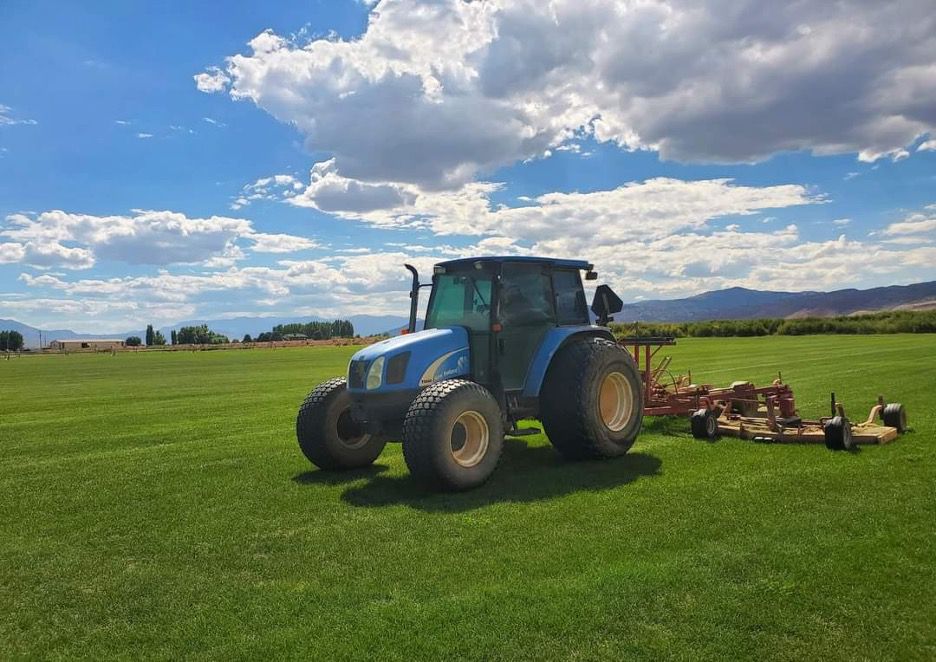Niche or Commodity, Big or Small, Farm Bureau Support Utah’s farmers and ranchers
Author
Published
8/22/2023
Before I met my husband (Easton), I never knew that people “cut up grass and put it down somewhere else”. That was a direct quote from me when he first explained that he was a sod farmer in Richfield, Utah. I was the daughter of a hay and cattle farmer/rancher in Eastern Idaho and knew nothing about the sod business. That was soon to change. My husband’s passion for sod, farming, and general agriculture was evident from the beginning and shaped how we would eventually make our way back to the farm and become involved in Farm Bureau.
Sod is an interesting crop - far different from the alfalfa and grass hay I grew up with. It’s not a common crop in agriculture and is in the minority in Utah as well. From plant to harvest, it usually takes about a year to 18 months to grow and produce. As such we need to keep a rotating crop to always have a supply. Water is a large factor in how fast sod is grown and also in its green appearance. The last few years of low water levels have changed the way we have had to operate. We have had to innovate, get creative, and think outside the box to ensure that our sod operation, our way of living, and our love of agriculture can continue.
A lot of the credit for keeping the sod business alive during a drought goes to my father-in-law. He has a talent for never giving up and turning lemons into lemonade. In 2018, our farm was basically destroyed by a flash flood coming down the canyon, bringing rocks, sticks, dirt, and debris with it. Through the help of friends formed in the Farm Bureau and through interaction and friendships with competitors, we were able to limp through the season and start our crops over again. Meanwhile, my father-in-law saw the flood, and the rocks that came with it, as a chance to keep money rolling while we tried to recover. Along with my husband, they started a new gravel and rock business, producing and selling gravel, topsoil, compost, and other landscaping materials. This business has helped support the sod farm through the drought. As people have been looking toward more drought-friendly landscaping ideas, we have been able to continue to serve their needs. Sometimes I wonder where we would be had we not decided to turn our trials from a negative to a positive. That is what farming, and by extension, Farm Bureau is about. Supporting each other and overcoming our trials.
Being in the minority of occupations as a farmer, we have gained a lot of support from our friends in Farm Bureau. Through the grassroots process, we have been able to bring our struggles with “grass for cash” legislation and water-efficient landscape regulations (which fail to recognize the benefits of and need for landscape plants in urban environments), into Farm Bureau and state legislation discussions, and even to a federal level of attention. Farm Bureau exists for this reason. To be the voice of agriculture and to bring like-minded people to support and help each other. Farm Bureau is not just for the more common farmers and ranchers, but for those who are more uncommon as well.

As sod farmers and Farm Bureau members, we try to support all of agriculture big and small, because only by standing together can we succeed. As we do so we will be able to find the support we need to overcome all of our challenges. It is amazing what farmers and ranchers are willing and able to do to assist their competitors and friends through hard times. When we as farmers and ranchers stand together, there is nothing that politics or nature can throw at us that we can’t withstand and overcome.
Throughout our years of marriage, I have learned that not only is sod much different than hay, but that just like everything else, it comes with its challenges. With increased water levels this year, we have been blessed to improve and grow our crop easier compared to years before. But we still have work to do. Politics and regulations are slowly creeping in on the sod business, which is such a niche crop that it might be easy to overlook. But once sod is “canceled”, what forms of agriculture are next?
We are grateful to know that Farm Bureau, and its members, are empowered to support all agriculture, no matter how small. As farmers and ranchers, we are willing to do the hard work. We consistently turn lemons into lemonade and work with what we are given. We support and help each other in hard times. That is what Farm Bureau is about. Let us continue to support the little guys, the niche crops, Utah’s farmers and ranchers, and all ag supporters. We are stronger together!
Josey and her husband Easton are from Sevier County and serve as the District 6 Representatives for the State Young Farmer & Rancher (YF&R) Committee, which includes Garfield, kane, Piute, Sanpete, Sevier, and Wayne Counties.
Want more news on this topic? Farm Bureau members may subscribe for a free email news service, featuring the farm and rural topics that interest them most!
